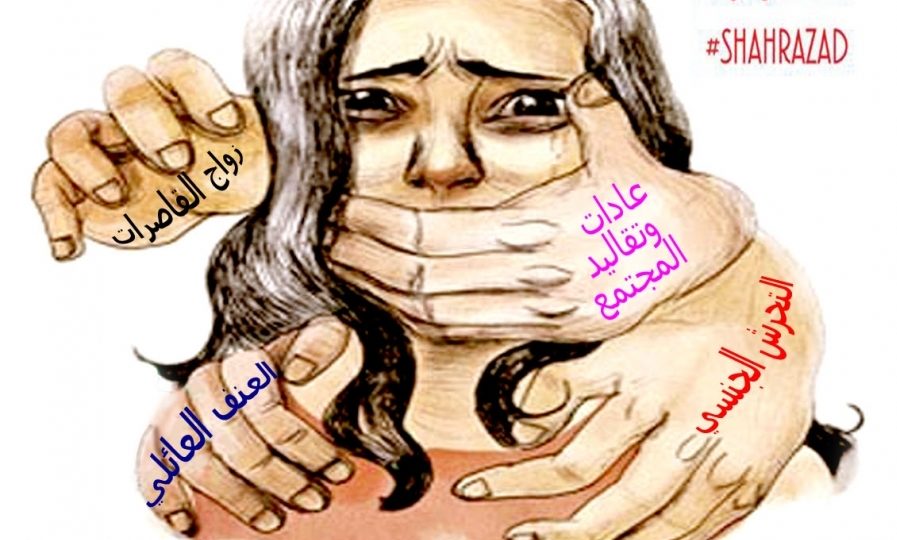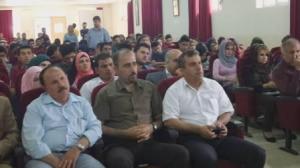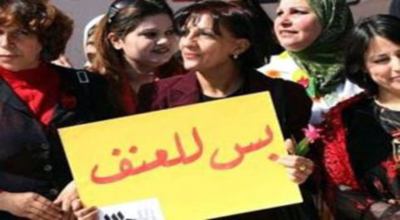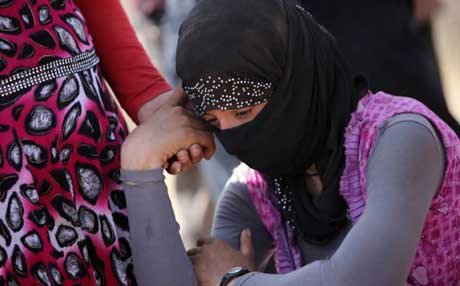In Kurdistan, Harassment Cases are Increasing in Refugee Camps and in Doctors’ Clinics!
Erbil – Shahrazad Campaign Demands Urgent Action
The Iraqi Civil Society Solidarity Initiative (ICSSI) – September 2015
After field studies identified many incidents of harassment occurring in many public and private places, including refugee camps and doctors’ clinics. The Shahrazad Campaign and Al-Masalla Organization in Kurdistan are demanding that the Kurdistan Regional Government and the Central Government respond to the growing phenomenon of the very real risk of sexual harassment of girls and children. Both governments need to find social, legal and economic solutions to address this dangerous phenomenon. This report details the recent activities of the Shahrazad Campaign in Iraqi Kurdistan and the principal conclusions of those activities.
- Harassment in refugee camps
Shahrazad Campaign members documented the phenomenon of harassment of children within the Bahraka Camp, in the province of Erbil. The instances included harassment by adults of children of both sexes, as well as harassment of children by other children. The observed harassment included cases of inappropriate physical contact and removing the clothing of a victim. An attempt to gang rape a girl of only 11 years only was also reported.
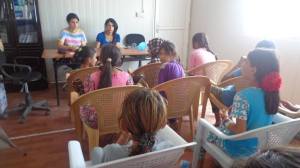
The Campaign contacted a number of organizations about this phenomenon in an attempt to confront the spread of harassment through coordinated action among the organizations. Activists from the campaign also distributed pamphlets to raise awareness aabout the dangers of harassment. The Campaign manager met with Al-Masalla Organization, Intersosm, and Save the Children: at the meeting it was agreed to form a focus group in Baharka Camp with children under 15 years of age.
Bahraka Camp is located near the city of Erbil; inhabited by displaced people of different nationalities and religions, it is currently a home to more than 5,000 people. A meeting was held with 23 girls under the age of 13 with the aim of better understanding the experiences and understanding of girls inside the camp. The discussion was very friendly and open. The following summarizes some of the main findings:
- Children are sexually harassed when they go to or return from the playground; some organizations inside the camp have made an area inside the camp into a playground for the children. Because of this, often parents do not let their children to go to the playground and instead keep them in their tents.
- One individual who is perpetrating harassment has been leading children away from the road so that he can harass them in the secret.
- The guards at the playground also harass the children while they are there.
- One little girl who had some awareness about sexual harassment from her parents tried to hit the harasser and threw stones if the harasser followed her or harassed her verbally.
- The girls asked to be separated from the boys at the playground because the boys copy older people they see and are learning to sexually harass the girls.
- Sexual harassment in doctors’ clinics
The Shahrazad Campaign manager in Erbil conducted interviews with patients who were victims of sexual harassment by doctors. The results are summarized below:
Patient being harassed by a physician
The first victim V…… was suffering from pain in her stomach and esophagus. She asked for a good doctor and was advised to see Dr. T……… She brought her mother along when she went to the doctor. In the examination room Dr. T……. took her behind a curtain. During the examination, the patient felt uncomfortable, but tried to convince herself that what was going on was just a normal examination. When the doctor finished, he told her to come again, and to be more comfortable, and leave herself in his hands. At that point, the victim knew that what had happened was not a standard examination, but sexual harassment. V……. left the clinic immediately. During the interview she said that she would not have hesitated to complain at that time had she known the law relating to sexual harassment.
Sexual harassment by a therapist:
The second victim is called Sh……. After her husband died in the war, she experienced severe psychological shock. She was unaware of what was going on around her and seemed to be in another world. Her family took her to a therapist to help her deal with the trauma. The therapist took advantage of her vulnerability and sexually molested her. The victim told her family later -when she had recovered from her trauma – about the sexual harassment, saying that she had not understood anything at the time, that she was unaware of what was happening and also unable to defend herself.
Sexual harassment by a dentist
The third victim is called A…. She suffered harassment at the hands of her dentist. A…… wore braces on her teeth, which required periodic visits with her dentist. The dentist took advantage of her seated position, and sexually molested her, especially during those very vulnerable moments when she was unable to move or talk. A….. threatened the dentist and told him she would not hesitate to break his hand and file a complaint about him at the police office.
- Collective harassment: Is it reasonable to have the solidarity of society against the victim?
Sulaimaniya province experienced a case of collective harassment of a girl. Videos and photos of the incident were disseminated through Facebook and it was noted that most of the comments and reactions blamed the girl, and seemingly justified harassers. Media also blamed the victim for her clothing style and the places she frequented. There was very disturbing solidarity with the harassers rather than solidarity with the victim.
If we analyze the issues, we can see that clothing, behavior and where we go are personal freedoms belonging to the individual. No one has a right to intervene or punish someone for exercising these freedoms. Intellectuals and activists in the field of women’s rights explained that this case shows the growth of extremist thought and the spread of political Islam in Kurdistan.
- Civil society movements and awareness are addressing harassment, but more is needed
The Shahrazad Campaign and the involved organizations, are not focusing on monitoring only, they are also cooperating to raise awareness and clearly define the phenomenon of harassment and ways to address it. Recently, campaign activists conducted number of visits and carried out awareness activities, which included:
Visit to Behrmend Center
Al-Masalla Organization as part of its Shahrazad activities held a meeting with the officer “Hemin Ameen” who works in the sexual harassment office in Kurdistan Iraq. Together, they put on a workshop for 20 girls under 18 years of age. The workshop started by defining sexual harassment as a damaging and increasingly prevalent phenomenon, which has particularly sharply increased in Iraqi society since 2003. The discussion focused on making the girls understand that sexual harassment should not elicit feelings of guilt or timidity — they are not to blame for these serious violations. They are the victims, while the perpetrator of sexual harassment is the one who is at fault. The workshop also informed them of their rights as laid down in Iraqi law. At the end of the workshop, girls shared their own stories about sexual harassment.
Behrmand Center is one of the non-governmental agencies that works with Al-Masalla organization in Erbil. The center provides legal advice and support for GBV (Gender-Based Violence) as well as a variety of classes (including sewing, computer, and language).
Visit to Khabat Center
The Campaign organized a similar session in Khabat Center, which was attended by approximately 16 women. The activists of the Campaign noted that women are placing the blame on themselves for have been harassed. Most of then have internalized the norm that harassment means that they were in the wrong place or they wore inappropriate clothes. Some of them even demanded that the victims of harassment should be punished!
Harassment is so widespread in Khabat that a girl cannot go out of her house without companionship. Any woman ho goes out of her house is typically harassed several times. Most women try their utmost to avoid leaving their homes. The discussion aimed increase women’s appreciation of their self-worth and rights: to build their belief that women must have the freedom to get out of their homes and wear whatever they want. No one has the right to harass a woman for any reason.
With the support of the center director and the social researcher, it was agreed that the women would report any instance of harassment and identify places where harassment is common, in order to get the Directorate of Combating Violence Against Women and police departments in the district of Baharka to get the women the help they need.
Khabat center is one of the non-governmental agencies that works with Al-Masalla Organization. It is located in the district of Khabat in Iraqi Kurdistan. The Center provides counseling and psychological support for women who are victims of violence, as well as range of educational courses (sewing, computer, basic languages), as well as operating a health care clinic for women.
Visit to Ashy Center
The Campaign organized a meeting in Ashy Center, a women’s center that provides legal and consulting services for women, and invited Major Sami Abdullah from the Directorate of Combating Violence Against Women, in order to give a lecture on the legal aspects of violence against women both within and outside of the family. The meeting was attended by 21 women and lasted one hour. The lecture included information on the number of cases of violence against women, including: women trafficking, marriage and divorce, prostitution, harassment, polygamy, marital rape, and underage marriage. At the end of the meeting, participants asked Major Sami Abdullah several questions about legal issues.
Shahrazad is a campaign by civil society organizations that aims to end the phenomena of sexual harassment and underage marriage. The Campaign is led by Al-Masalla Organization for Human Resources Development in Kurdistan and by The Iraqi Women Journalists Forum in Baghdad. The campaign conducts its activities in Kurdistan and the rest of Iraq in cooperation with the Iraqi Social Forum and a number of other civil society organizations. Shahrazad Campaign enjoys international support and cooperates with international organizations active in Kurdistan, including the Iraqi Civil Society Solidarity Initiative (ICSSI) as well as Un Ponte Per Organization.
For more information, please visit the website: http://www.almubadarairaq.org/?p=1916
You can also visit Shahrazad Campaign page on Facebook

